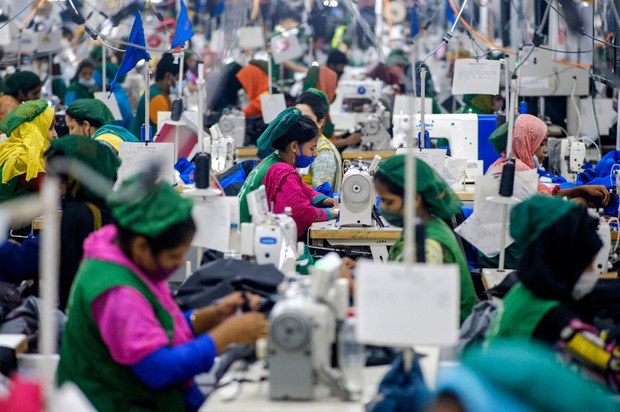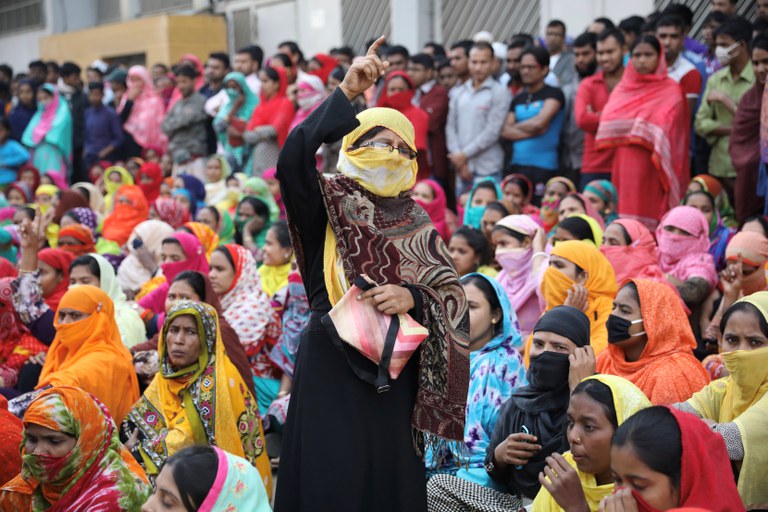Global Retailers Agree to Extend Safety Accord for Bangladesh Garment Workers
2021.08.25
Dhaka
 Garment employees work in a sewing section of the Snowtex Outerwear Ltd. factory in Savar, Bangladesh, Aug. 9, 2021.
Garment employees work in a sewing section of the Snowtex Outerwear Ltd. factory in Savar, Bangladesh, Aug. 9, 2021.
Global clothing retailers and a pair of international workers’ unions have agreed to a two-year extension for an accord that would make retailers legally accountable for workplace safety at thousands of Bangladesh’s garment factories, the unions said Wednesday.
However, the signatories will have to implement the safety program through a government body, the RMG Sustainability Council (RSC), according to a copy of the draft agreement seen by BenarNews.
“Representatives from international textile retailers have reached a new, 26-month agreement with UNI Global Union and IndustriALL that builds on the progress made by the ground-breaking Bangladesh Accord while promising to expand the scope of the Accord’s legally binding commitments,” one of the two unions, UNI Global, said on its website.
“The renewed agreement preserves and advances the fundamental elements that made the Accord successful,” the other union, IndustriALL Global, said on its website.
It listed provisions to promote worker safety and workers’ rights. These include respect for freedom of association; shared governance between labor and brands; a high level of transparency; a safety committee training and worker awareness program; and “a credible and independent complaints mechanism,” the union said.
The RSC did not exist when the first iteration of the accord was signed in 2013.
The first accord was prompted by the April 2013 collapse of the Rana Plaza garment factory complex in Dhaka that killed more than 1,100 workers. It was the deadliest industrial accident in Bangladesh’s history.
The accord’s name has changed. It is now called the International Accord for Health and Safety in the Textile and Garment Industry. It will take effect on Sept. 1, a day after the previous agreement expires.
The first accord was in force from 2013 to 2018. Some 200 top retailers signed it, including H&M, Hugo Boss and Primark.
The latest agreement’s retail signatories have not been disclosed yet, but H&M and Inditex confirmed to The New York Times that they are part of it. Walmart, the American retail behemoth, told the Reuters news agency that it was not part of the new accord.

Garment workers protest for higher wages in Dhaka, Jan. 9, 2019. [Reuters]
Bangladesh’s 5000-odd garment factories employ 4.4 million workers. The industry accounts for a little more than 80 percent of the country’s exports.
The first accord had been very successful, according to the Clean Clothes Campaign, because it was “a binding agreement that has real punishments for brands, retailers, and factories who do not take enough action.”
For instance, thanks to the accord, a multinational apparel brand – its name was not disclosed according to a settlement – paid the two global unions a U.S. $2.3 million settlement in 2018 to remedy life-threatening workplace hazards in 115 garment factories in Bangladesh, UNI Global said.
The Clean Clothes Campaign is a global network dedicated to improving working conditions and empowering workers in the global garment and sportswear industries.
The latest draft agreement to extend the accord from Sept. 1 until 2023 does not include the following provision that existed in the 2013 and the 2018 agreements:
“The objectives of the protocol are to (i) support and motivate the employer to take remediation efforts in the interest of the workforce and the sector and (ii) expedite prompt legal action where the supplier refuses to undertake the remedial action required to become compliant with national law.”
In addition, the Bangladesh government regulator RSC is now in the mix – it has been implementing a health and safety program of the accord since June 2020 and will continue, according to the draft agreement viewed by BenarNews.
Last October, witnesses to the earlier accord expressed grave concerns about the efficacy of RSC because it was governed by a board comprised mostly of brands and factory owners.
‘RSC does not belong to workers’
On Wednesday, many workers and a major garment workers’ union said they were happy the accord had been extended, but they criticized the government regulator RSC, saying it was ineffective and friendly to factory owners.
“RSC is not a helpful platform for the workers. It is an initiative to help the owners,” Babul Akhter, general secretary of the Bangladesh Garment and Industrial Workers Federation (BGIWF) told BenarNews.
“I am requesting all international buyers to stay under the accord. Otherwise we will withdraw our representations from RSC.”
He said workers have become panicked since the recent Narayanganj factory fire incident that killed 51 people, although it was not a garments factory but a juice producer.
According to local news reports, the earlier Accord on Fire and Building Safety in Bangladesh shut down its operation in the country and handed over charge to the RSC when the local body took over the safety program in June 2020.
Rafiqul Islam, a worker at Abanti Color Tex Ltd, said he was a little more optimistic now that the accord has been extended.
“We are seeing some hope, even if the accord works from abroad. The accord is very important for keeping our workplace safe,” Islam told BenarNews.
“Owners are against the accord because it gave more priority to workers than to them.”
Salma Akter Mim, who works at Dress and Dishmatic, has been a garment worker for 18 years.
“The accord made us powerful and ensured safety in the sector. But the RSC does not belong to workers, it is very much loyal to the owners and other authorities,” she told BenarNews.
Salma, 30, told a story to describe what she believes is the RSC’s lack of transparency.
“When an Accord team used to visit a factory, they would talk with workers and provide their phone numbers to workers for further communication,” she said.
“But, recently a team from RSC visited my factory. The RSC representatives were surprised when I sought a business card from them. They asked me why I was asking for a card from them. This is an example of the difference between the accord and the RSC,” Salma said.
BenarNews asked Iqbal Hussain, RSC’s managing director, about workers’ dissatisfaction with the body.
“We are an independent national initiative,” is all he said, refusing to say more.
Md. Ehsane Elahi, Bangladesh’s Labor and Employment secretary, said the government would look into the grievances of the workers.
“The government is always highly serious about the safety and security of the industrial workers as well as RMG sector workers,” he said, referring to workers in the ready-made garment industry.
But a major trade organization of factory owners said the accord’s extension does not mean much, because it no longer exists in Bangladesh.
“They [the accord] might be doing some supervision of the RSC, nothing [much] out of it,” Md Shahidullah Azim, of the Bangladesh Garment Manufacturers and Exporters Association, told BenarNews.







